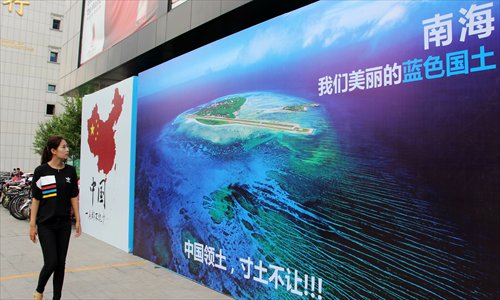Netizens demand celebs defend China, boycott foreign goods

A woman walks past a poster about the South China Sea in Weifang, East China's Shandong Province on Thursday. Photo: CFP
South China Sea arbitration has sparked nationalistic responses among many Chinese netizens, with some celebrities facing hostility for not seeming patriotic enough for these angry posters.
The Permanent Court of Arbitration at The Hague ruled last week that there is no legal basis for China's nine-dash line.
Many popular entertainers took to Sina Weibo to protest the ruling. Celebrities that posted about the ruling included martial arts star Donnie Yen, popstar Lu Han and the teen group TFBOYS, according to Sina Entertainment.
"Showing patriotism should be praised, especially among celebrities who can also drive the emotion of their fans," Hu Xingdou, a professor at the Beijing Institute of Technology and expert on China's social problems, told the Global Times.
Jia Nailiang, an actor with more than 51 million followers on Sina Weibo, earned nearly 1 million likes from users for his plethora of patriotic posts about the ruling.
"Long live China! Good job, Jia!" wrote Sina Weibo user "Yunzhong Liangduohua."
However, Hong Kong singer and actress Charlene Choi, who posted a photo of herself at work on the night of July 12, several hours after the arbitration result was declared, was criticized for not adequately defending China by many netizens.
"The country is facing danger, and you are here posting on Weibo," Sina Weibo user "A Little Star in the Sky" commented under Choi's post.
On July 13, Choi replied by saying that "I don't need to say that I love my country all the time. I didn't say anything when I donated to schools and disaster zones in the Chinese mainland… We are all making efforts to make contributions to society."
Choi's response won her more than 60,000 likes and 25,000 comments, with many people showing their support for her stance.
Weapon of nationalism
It was announced on Friday that famous Taiwan actor and director Leon Dai is to be replaced in the mainland-produced film There Is No Other Love due to massive protests by netizens who claim that the actor is a Taiwan separatist.
Previously a post on the film's official Sina Weibo account announced that filming on the movie, the second film directed by actress-turned-director Zhao Wei, had just finished.
The announcement set off a huge backlash from mainland netizens, who argued out that Dai, one of the film's lead actors, has made statements that hinted at pro-Taiwan independence leanings in the past.
Many Chinese netizens demanded Dai to apologize for being a separatist and state he is Chinese.
Dai posted a clarification statement on Friday, which garnered more than 61,000 reposts and 120,000 comments in Sina Weibo, but it didn't satisfy his nationalist critics.
In his statement, Dai claimed he was taught to be proud of being Chinese, never a "separatist.""I was not sensitive to politics. I never thought what I did would cause so many conflicts." Dai wrote.
In January, Tzuyu Chou, a 16-year-old K-pop star from Taiwan, was accused of being pro-Taiwan independence, and was forced to apologize.
"Though entertainers can influence society and especially young people and they have to bear great social responsibilities, it doesn't mean the celebrities have to be forced to show their stance on each event. That would be ridiculous," Hu added.
Stay calm
After the arbitration result, Net users have leveled false accusations against public figures and have lead people into boycotting foreign products and brands such as Philippine bananas, iPhones and KFC.
"Our online shop will not sell Cebu mangoes from the Philippines and will not sell any snacks imported from the country anymore," a Shanghai-based Taobao vendor who declined to be identified, told the Global Times.
Another vendor in Guangzhou, Guangdong Province, put a notice on its online shop, saying that "this shop will no longer sell dried mangoes imported from the Philippines and will give any snacks now in stock to consumers who provide their address for free."
The hashtag "strike down China" has garnered 2.4 million views on Sina Weibo, with some netizens claiming when you type "strike down" in Chinese in an iPhone, the phone will automatically add the word "China." However, this is an automatic association based on users' search history rather than a conspiracy led by US-based Apple, the People's Daily reported Monday.
"These events show that long-term patriotism education is effective, but proper limits for speech or action are necessary," Zhang Xiaojin, director of department of Political Science under Tsinghua University, told the Global Times.
"Something ridiculous, narrow-minded and extreme can seem rightful and positive, which is ridiculously wrong," said Yu Guoming, vice-dean of the Journalism School at the Renmin University of China.
People should stay calm, reasonable and tolerant when talking about patriotism, Hu said.
"True patriotism is not shouting slogans, but truly taking the responsibility to the country and to the world," Yu said.
Newspaper headline: The patriotism police